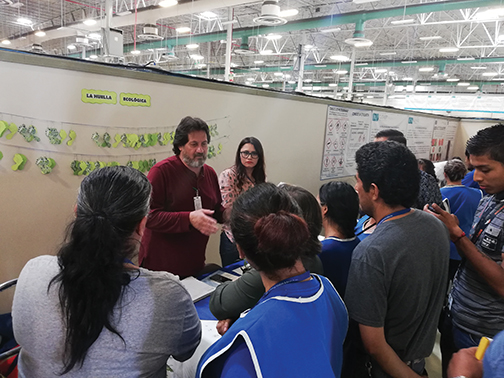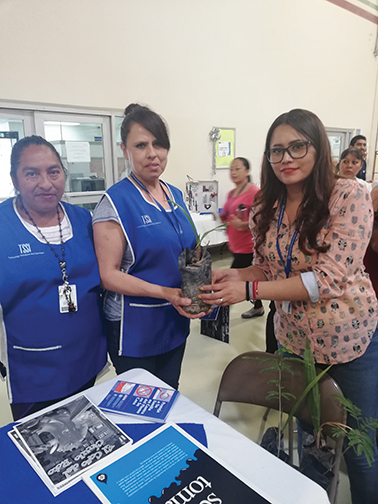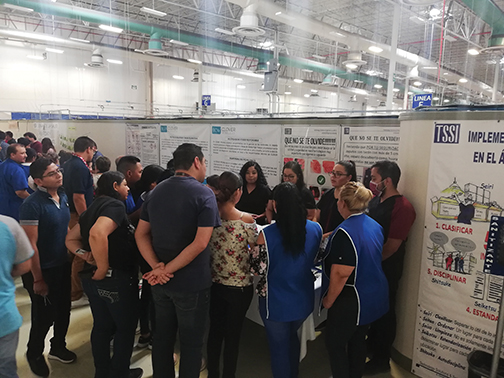The Maquiladora Effect: A Value Chain for the Community
By Owen Sedej, United States Air Force Academy with Clover Wireless
Summary
In this article, Cadet First Class Owen Sedej (USAF) describes how global U.S. companies’ mandate that their maquiladora operations adhere to global health and environmental standards (such as R2 & ISO) improves the broader community. Typically, maquiladoras are foreign-owned Mexican factories that export their products to that foreign country. Further, C1C Sedej will explore how the U.S. Air Force can extend these findings from the commercial sector to American bases operating on foreign soil.
Since 1964, with the beginning of the Mexican government’s maquiladora program, global U.S. companies have established maquiladoras on Mexican soil, acting as a catalyst for communities to develop around them. For example, several American-based electronics companies operate along the northern Mexican border in cities such as Mexicali and Ciudad Juarez. These border cities have grown substantially over the past few decades alongside the businesses that have emerged there under the North American Free Trade Agreement (NAFTA). Policies from the original equipment manufacturer and NAFTA require multifaceted operational compliance, including ISO (International Organization for Standardization) standards, R2 (Responsible Recycling) standards, and Mexican and international regulations. Compliance is vital to a proper organization; however, in many cases, companies limit their compliance to their customers’ specific production requirements. Some maquiladoras look at how they can apply their operational compliance knowledge to benefit their local communities. These maquiladoras operate in very competitive environments; being recognized as a maquiladora that is committed to improving the environment and employees’ health helps attract and retain the high-quality workers maquiladoras need to be successful. Extending their operational compliance responsibility to include the broader community where their employees live and work helps maquiladoras create a mutually beneficial impact to themselves and their employees.

Social responsibility is commonly used as an accolade for companies compliant with the standards that they elect to follow; however, true social responsibility is not an accolade but an obligation. Through education and innovation, a company can create a culture that includes its employees and the broader community in social responsibility. For example, in Ciudad Juarez, one company hosts an annual environmental and safety week where employees are encouraged to participate in activities that help to develop a socially responsible mindset. One task encourages employees and their families to bring in recyclable bottles and cans. The money raised from this recycling effort is donated to a non-profit that provides eye surgery to underprivileged children in the community. Another activity teaches employees and their families how to plant trees and then gives them an indigenous tree to plant within the community. This company also hosts an activity that illustrates the principle of reuse in the reduce, reuse, recycle model; by creating a competition for the employees’ children to create something from waste material. Additionally, there are educational booths hosted by external suppliers and a water-care-awareness symposium hosted by the municipality. The week concludes with the employees writing on a communal art piece to show that they are empowered to reduce their environmental footprint. In Mexicali, a maquiladora plant deploys an outdoor air-scrubbing system that cleans approximately fifty-thousand cubic meters of air per day within the city1. The system uses low maintenance filters and solar panels to provide a clean and safe solution for improving air quality. While seemingly scattered, all of these efforts target one goal: empowering the people in the community to understand social responsibility and make their community a better place to live.
On the surface, military bases have some similarities to these Mexicali and Ciudad Juarez plants. Military bases are an American entity, operating on foreign soil, with substantial logistical supply chains. These military bases can learn from their private-sector counterparts to become better partners and improve their surrounding communities. The framework for how the private-sector maquiladoras influence the surrounding communities follows a two-step process:
1. Demonstrate compliance and social responsibility of the organization
2. Educate, include, and empower those surrounding the organization

Following this new, two-step formula is essential. The first step builds trust and legitimacy between the community and the foreign organization. The private sector follows stringent regulations showing investment in being a responsible entity and regional partner. The military and other local facilitators can demonstrate this same responsibility in the ways that they act, impact, and invest in the region. Once these entities gain this legitimacy, the second step can then focus on including the community in these efforts by educating them on what they are doing to maintain a healthy environment in their area of operations. This process concludes with empowerment as people in the community realize how they can improve and solve the environmental issues that they are facing internally. These solutions that come from within the community are sustainable as they imbue a sense of autonomy to the community with regards to its environment and social responsibility.

Looking through the lens of national security at the areas that the United States operates bases, it is important to empower the communities to take care of their own environment so that insurgencies do not do so instead. Rukmini Callimachi, a correspondent for the New York Times covering ISIS and Al-Qaeda, discusses the extent to which communities become vulnerable in the absence of empowerment and social responsibility. She describes how, in Mosul, ISIS used brute force to force sanitation workers to, “Knock on doors in order to ensure that everyone was serviced.”3. In fact, while she was interviewing community members located within Mosul, a city formerly held by ISIS, one said, “I have to admit, it was much cleaner under ISIS.” 2 This shows how it is important to empower people to take care of their community’s environmental issues, because, with independence in regards to their environment, a community could resist one method in which an extremist organization could gain and maintain power.
Since poor environmental management is a vulnerability that allows extremist organizations to root themselves in a given community, great care should be taken to identify and support communities with environmental problems. One way to do this is to follow the model that multinational corporations are using to become better regional partners with their international factories. By first demonstrating compliance and social responsibility, the United States can then earn the trust of the people, allowing them to follow on with education and inclusion in environmental practices. The result of these two methods empowers and supports vulnerable communities to become autonomous environmental managers.
The views expressed in this article are those of the author and do not necessarily reflect the official policy or position of the United States Air Force Academy, the Air Force, the Department of Defense, or the U.S. Government. PA#: USAFA-DF-2019-376.
Works Cited
1. https://www.pulmonurbano.com/index.php/adopta-un-pulmon-solar-para-tu-negocio
2. https://www.nytimes.com/interactive/2018/04/04/world/middleeast/isis-documents-mosul-iraq.html
3.https://twitter.com/rcallimachi/status/983106147304472576
 Owen Sedej
Owen SedejOwen Sedej is a rising senior (Cadet First Class) at the United States Air Force Academy (USAFA) in Colorado Springs pursuing a Bachelor of Science in Civil Engineering and a minor in Arabic. He is a member and a team captain of the USAFA water polo team as well as he serves as a Personal Ethics and Education Representative where he oversees the connection of support and referral services to approximately a thousand cadets. This summer, Cadet Sedej worked as the Cadet in Charge of Society of American Military Engineers camp, which is offered to High School students interested in STEM (Science, Technology, Engineering and Math). For the last part of this summer, Cadet Sedej conducted research at the Clover Wireless maquiladora plant in Mexicali, Mexico. Here, he combined his two passions, environmental engineering, and international study, to investigate how multinational corporations impacted foreign communities, and if there were any principles the Air Force could adopt in regards to their international footprint. A special thanks to Mr. Jim Ball, Mr. Sergio Rodriguez, Mr. Anurlfo Solis, and Mr. Filiberto Amaya and his team for their help and support on this project.
- The views expressed in this article are those of the author and do not necessarily reflect the official policy or position of the United States Air Force Academy, the Air Force, the Department of Defense, or the U.S. Government. PA#: USAFA-DF-2019-376.